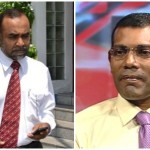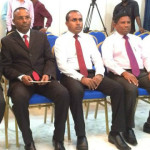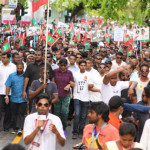Additional reporting by Mohamed Saif Fathih and Ismail Humaam Hamid
Former President Mohamed Nasheed’s lawyers have named two of the three judges overseeing the opposition leader’s terrorism trial as witnesses, and requested the pair to excuse themselves from the bench.
In a letter to the Criminal Court today, lawyer Hassan Latheef asked Judge Abdulla Didi and Abdul Bari Yoosuf to step down, noting that the two were present with Judge Abdulla Mohamed at his residence during his arrest by the military.
The two judges witnessed the conversation between Judge Abdulla Mohamed and military officers, and could testify he had not been kidnapped as charged by the Prosecutor General, Latheef contended.
Nasheed is being prosecuted for the judge’s detention under the Prevention of Terrorism Act of 1990, which criminalises kidnappings and abductions. The offence carries a jail term between 10 and 15 years.
At a first hearing yesterday, Judge Abdulla Didi gave Nasheed three days to appoint a lawyer and answer charges. The former president is to be kept in police custody until the end of the trial.
Speaking to Minivan News, Nasheed’s lawyers continued to express concern over bureaucratic delays in both appealing the Criminal Court’s arrest warrant and registering to represent him at the next hearing on Thursday.
The Commonwealth, India, US, and Canada have expressed concern over the former president’s arrest and denial of right to legal counsel and appeal.
Medical attention
A police spokesperson confirmed to Minivan News that Nasheed was brought to Malé at 2:20pm today for medical attention upon his request. But neither his lawyers nor his family were informed.
Nasheed limped into the courtroom yesterday using his tie as a makeshift sling for his arm. He claimed police officers had broken his arm and repeatedly asked for immediate medical attention.
The Maldives Police Services’ Superintendent Hamdhoon Rasheed denied allegations of police brutality last night, claiming Nasheed had staged his own fall.
Rasheed said Nasheed’s fingers and arms were not hurt according to doctors at the Dhoonidhoo Island Detention Center.
Nasheed’s legal team said they are not certain if police had arranged for an x-ray as advised by the doctor.
A police spokesperson declined to comment on the matter, stating: “medical assistance and attention will be given to all detainees under police custody.”
Nasheed’s lawyers have now requested Home Minister Umar Naseer to transfer him to house arrest.
“We are extremely concerned about the safety and security of President Nasheed, especially after what we saw yesterday in front of the court house. The police brutalised President Nasheed in front of the press and he is physically hurt,” Latheef said.
Judge Didi ordered the police to provide Nasheed appropriate medical care while he remains in custody.
Appeal delayed
Lawyers were unable to appeal the Criminal Court issued arrest warrant today as the forms required Nasheed’s signatures and had to be submitted to the Criminal Court before noon.
New appeal regulations state appeals of any court ruling must be first submitted to the court responsible for issuing the ruling. The court would then forward the forms to the appellate court.
Nasheed’s five-member legal team attempted to file an appeal on Monday, but were unable to do so due to the Criminal Court’s failure to provide the forms.
Lawyers said the Supreme Court’s new regulations impede the right to appeal as enshrined in the constitution.
The opposition Maldivian Democratic Party (MDP) has meanwhile requested the Human Rights Commission of the Maldives (HRCM) to investigate the police’s treatment of the former president, his arrest and proceedings of the terrorism trial.
HRCM member Jeehan Mahmoud confirmed the commission’s staff had visited the former president at Dhoonidhoo last night, but declined to give further details.
In a statement condemning the police’s unlawful use of force yesterday, the HRCM also called on the police to provide Nasheed with medical attention immediately and ensure he is afforded all constitutional rights.
The Police Integrity Commission was not responding to calls at the time of press.
Speaking to Minivan News, a spokesperson from the Prosecutor General’s Office today insisted the office was following due process in charging Nasheed with terrorism.
The PG’s office had initially charged Nasheed with arbitrary detention under the soon to be outdated Penal Code, but withdrew charges on February 15 for further review.
A statement issued on Sunday said Prosecutor General Muhuthaz Muhsin had decided “the best way [forward] in this case is to change the charges raised against Mohamed Nasheed and the court in which it was filed”.
“Therefore, as the case against Mohamed Nasheed is in the court process, we note that it is not desirable for politicians, some members of the public, political parties, and some media to talk in a way that both creates anxiety among the public about verdicts issued by courts and causes loss of confidence in independent institutions created by the constitution,” read the statement.
Related to this story:
Police deny brutalising Nasheed
Former President Nasheed arrives in court with arm in makeshift sling
Nasheed denied right to appoint lawyer and appeal “arbitrary” arrest warrant, contend lawyers
Police arrest former President Mohamed Nasheed ahead of terrorism trial
 (0)Dislikes
(0)Dislikes (0)
(0)





The key question that arises is whether this trial is being held according to the principles of Islamic Sharia Law or not, as already pointed out by Brigadier (retired) Didi.
We await an answer on that.
Prosecutor General Muhuthaz Muhsin is guilty of protecting a child abusing judge, and by extension, serving as a 'vector' for the abuse of children in the Maldives.
The sentence for protecting the child-abusing judge is 72 years in prison, with parole possible after 50 years.
The sentence for serving as a vector for state-sponsored child abuse is 510,275 consecutive death sentences.
The conditions for verdict appeal are as followed; testify as to who is directing your actions.
Appeal, if successful, will commute both sentences to a 40 year prison sentence - parole possible after 20 years.